REHOVOT, ISRAEL—May 20, 2024—A sociologist of education, a geneticist of skin cells, a chess grandmaster, a founder of Israel’s pharma industry and a couple who are scientists and philanthropists – these are the six recipients of honorary Doctor of Philosophy degrees from the Weizmann Institute of Science for 2023, bestowed upon them in recognition of their extraordinary contributions to society in different fields.
“We are living through an extremely difficult time in Israel,” said Weizmann Institute President Prof. Alon Chen, speaking at the conferment ceremony held on May 19, 2024, at the Michael Sela Auditorium on the Institute campus in Rehovot. “The country is mourning over the loss of life, waiting and hoping for the return of the hostages and looking forward to a successful resolution to the war. We are also witnessing growing antisemitism and anti-Israel sentiment globally, protests on college campuses that breach the boundaries of free speech into hate speech and violence, and calls for academic boycott and divestment. So far, Weizmann scientists have not been directly affected, and our collaborations are solid. But the concern exists – and we look forward to better days ahead.” The conferment ceremony was originally supposed to take place in November 2023 within the framework of Weizmann’s 75th Annual General Meeting of the International Board, which was postponed because of the October 7 invasion of Israel and the subsequent Israel-Hamas war.
“This year marks the 90th anniversary of the founding of the Daniel Sieff Research Institute, the precursor of the Weizmann Institute. This milestone provides us with the opportunity to recall the values upon which our Institute was founded: excellence, resilience, diligence and a commitment to expanding the frontiers of knowledge. Our honorary PhD recipients, whom we celebrate tonight, are powerful role models for these shared values,” Prof. Chen said.
The recipients of the Weizmann Institute of Science’s PhD honoris causa for 2023 are:
Prof. Sarab Abu-Rabia-Queder
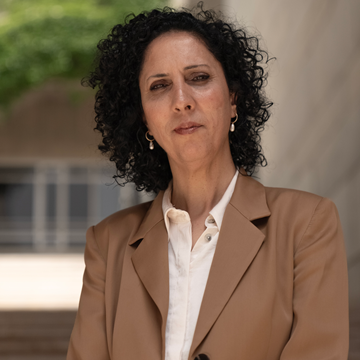
Prof. Sarab Abu-Rabia-Queder is an Arab sociologist and feminist activist who specializes in the sociology of education and gender studies in Israel. The first Bedouin woman in Israel to receive a doctorate, she is an associate professor in the School of Education at Ben-Gurion University of the Negev, where, in 2021, she was appointed Vice President for Diversity and Inclusion.
Prof. Abu-Rabia-Queder’s research focuses on how race and gender structure the educational experience of women and ethnic minorities in higher education, the workplace and family relations. Her academic interests developed from her life experience, which included elementary education in a traditional Bedouin village and her time as the only Arab student in a Hebrew-speaking Jewish high school in Be’er-Sheva. At the age of 18, she began her studies at Ben-Gurion University, where her personal insights became a springboard for activism and research. Teaching in a Bedouin school in Rahat, she was struck by how the school in which she worked lacked the resources she had enjoyed in the Jewish sector. She parleyed these insights into the first steps of her academic journey.
As a master’s student, Prof. Abu-Rabia-Queder’s thesis focused on educational and governmental policies that contribute to high dropout rates among female Bedouin students, a phenomenon that, in professional literature, had previously been characterized as the inevitable result of Bedouin cultural norms. In her PhD research, she dug deeper, conducting interviews characterizing how pioneering university-educated Bedouin women balanced their cosmopolitan dreams with the expectations of the families and villages in which they grew up and to which they planned to return.
After postdoctoral research at the Hebrew University of Jerusalem and the University of Oxford, Prof. Abu-Rabia-Queder joined Ben-Gurion University’s International School for Desert Studies and recently, the Department of Education, as a faculty member, where she went on to become the first Bedouin woman promoted to the rank of professor.
Prof. Abu-Rabia-Queder teaches courses on gender and feminism in the Arab world and on the sociology of racism in education. The author of numerous books and articles, she is also an activist for Arab women’s rights, and in 2019 won the Katan Award for social activism in academia, given by the Ruah Nashit (“Women’s Spirit”) Association. An inspiration to women and girls from the Bedouin community and beyond, Prof. Abu-Rabia-Queder’s personal and career path is devoted to bringing thoughtful people together to work toward a better future for women from marginalized communities, and a more hopeful future for all. She is married to Hassan and has three sons.
The degree is awarded to Prof. Abu-Rabia-Queder in recognition of her outstanding academic achievements in the sociology of education; her steadfast pursuit of excellence and inclusion, which has made her a powerful role model for Bedouin women as well as for other sectors of Israel’s society; and her untiring dedication to building a better world for minority women and marginalized communities.
Prof. Elaine Fuchs
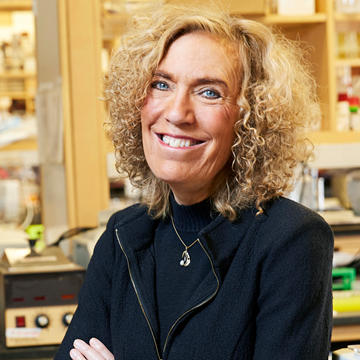
How do the stem cells of our body keep rejuvenating and repairing our tissues throughout our lives and how do they cope with environmental stresses, including aging, inflammation and cancer? Using skin as a model, Prof. Elaine Fuchs has been striving to answer these questions for over four decades, creating a body of knowledge that has enriched the global scientific community, while generating an extensive list of professional and personal accolades. These include being awarded the American National Medal of Science by President Barack Obama in 2008, serving as one of Pope Francis’ consultants on stem cell research at the Vatican since 2018 and receiving the 2020 Canadian Gairdner International Award, to name a few.
After completing her PhD in biochemistry at Princeton University, Prof. Fuchs pursued postdoctoral research at the Massachusetts Institute of Technology and served on the faculty at the University of Chicago before joining Rockefeller University in New York, where she holds the Rebecca C. Lancefield Professorial Chair. Fascinated by the diversity of cellular populations in the skin, she embraced recombinant DNA technology early on, using it in her successful hunt for genes responsible for human skin disorders. In subsequent investigations of how tissue stem cells make and repair the skin, she showed how communication between stem cells and their neighbors, particularly immune cells, can become altered, causing the stem cells’ proliferation to either accelerate (in the case of inflammation) or slow down (as occurs during aging).
Her recent work showed that stem cells of the skin are able to store long-term memories of their previous experiences, analogous to what happens in the brain. These memories endow the skin with the ability to heal wounds faster upon the next encounter and display broader resistance against pathogens. However, they also confer heightened sensitivity to inflammation, a feature often associated with cancers. Prof. Fuchs’ studies showing how cancer cells hijack the mechanisms that enable stem cells to replenish dying cells and repair wounds may lead to new therapeutic approaches that target cancerous stem cells without affecting tissue stem cells.
A dear friend of the local scientific community, Prof. Fuchs frequently visits Israel and has trained postdocs who went on to head their own labs. These include Dr. Shiri Gur-Cohen, a Weizmann-trained stem cell investigator who did postdoctoral research in the Fuchs lab at Rockefeller and discovered a new skin stem cell niche in the lymphatics, a breakthrough study that was published in the high-profile journal Science.
Through her research, Prof. Fuchs has helped us understand how stem cells respond to stress and maintain a healthy barrier between our body and the outside world. Her discoveries offer new avenues for exploring improved clinical treatment for disorders related to tissue regeneration and to aging.
The degree is awarded to Prof. Fuchs in recognition of her revolutionary work in revealing how skin stem cells respond to aging, inflammation and cancer, and mediate skin remodeling and repair; her identification of genes responsible for human skin disorders and her pioneering establishment of the field of reverse genetics – a gateway to discovering the genetic diseases that proteins cause when they malfunction; and her exemplary contribution as a role model and mentor to generations of young scientists.
Garry Kasparov
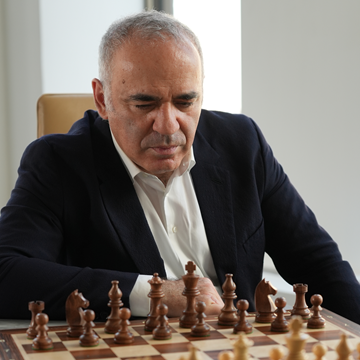
Born in 1963 in Baku, Azerbaijan, then part of the Soviet Union, Garry Kasparov was only 12 years old when he became the under-18 chess champion of the USSR. Achieving grandmaster status at age 17, he became the world’s under-20 champion that same year. In 1985, at the age of 22, he became the youngest world chess champion in history – a title he successfully defended five times over a 15-year period.
In 1996, Mr. Kasparov prevailed in a chess match against an IBM supercomputer called Deep Blue. One year later, following an upgrade to Deep Blue’s hardware, Mr. Kasparov was defeated in a rematch. In addition to making headlines all over the world – the rematch was featured on the cover of Newsweek with the headline “The Brain’s Last Stand” – the experience sparked Mr. Kasparov’s personal interest in artificial intelligence and robotics, areas in which he has remained a respected voice ever since.
Mr. Kasparov lectures regularly on the nexus between human and machine minds at many of the world’s leading educational institutions and tech and finance companies. His 2017 book, Deep Thinking: Where Machine Intelligence Ends and Human Creativity Begins, presents his views on human and machine competition and collaboration as well as the full account of his legendary matches against Deep Blue.
In 1990, Mr. Kasparov and his family escaped ethnic violence in his native Baku as the USSR collapsed. In 2005, still ranked No. 1 in the world, he retired from professional chess to form the Russian pro-democracy movement. In 2012, he was named chair of the New York-based Human Rights Foundation. Facing imminent arrest during Putin’s crackdown, Mr. Kasparov moved from Moscow to New York City in 2013. In 2017, he founded the Renew Democracy Initiative, dedicated to promoting the principles of the free world through education and advocacy.
Mr. Kasparov is a regular commentator on politics and human rights in major publications, as well as a highly sought-after lecturer on technology, strategy, politics and achieving peak mental performance. A strong believer in the value of chess for developing creativity, discipline and a sense of self-worth among young people, Mr. Kasparov is the founder of a nonprofit organization that promotes the integration of chess-related activities in educational settings around the world.
The degree is awarded to Mr. Kasparov in recognition of his historic achievements as a grandmaster and champion in the game of chess; his deep commitment to the promotion of chess education worldwide, bringing its countless educational benefits to children and adults everywhere; and his tireless efforts to champion democracy and human rights in Russia and across the globe.
Israel Makov
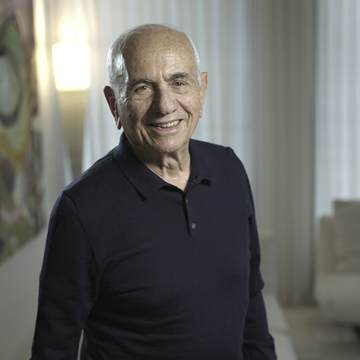
Mr. Israel Makov is among Israel’s most respected corporate leaders. He specializes in the pharma and medical devices industries and has led many companies to global success.
Working in the pharma industry since 1974, he founded Israel’s first biotech company, Interpharm, which partnered with the Weizmann Institute in the development of several commercial drugs.
In 1995, he joined Teva Pharmaceutical Industries as VP for Business Development and was appointed president and CEO of the company in 2002. Under his leadership, Teva became the undisputed global leader in the generic pharmaceutical industry and a global leader in the treatment of multiple sclerosis, based on Copaxone® – a Weizmann-developed drug that is now approved for use in 51 countries worldwide.
After Teva, Mr. Makov was chairman of the Netafim irrigation solutions company and of Given Imaging, the developer and world’s leading provider of capsule endoscopy, a pill that travels through the gastrointestinal tract, sending clear images to the physician.
In the last decade, he was chairman of Sun Pharma and played a significant role in the company’s global expansion. He guided the company into its next phase of growth with a focus on innovation and adoption of newer technologies. Under his leadership, Sun Pharma transformed from a $1.7 billion organization geared toward India and the United States into the world’s fourth largest specialty generic pharmaceutical company, operating across over 100 markets, with a turnover of over $5 billion. Leading the company’s global expansion, Mr. Makov spearheaded the acquisition of Ranbaxy Laboratories in 2014, making Sun Pharma the leader in the Indian pharmaceutical market and a strong player globally. He also helped steer the company toward a strategy of building a global pipeline of specialty products.
Mr. Makov currently serves as chairman of BioLight, a leading ophthalmic company that invests in companies and manages projects in the field of eye disease and ocular treatment. He is also chairman of QuantalX Neuroscience, a company developing direct electrophysiological imaging (Delphi-MD) for early, precise and objective evaluation of brain function, and of Nextage Therapeutics, a pharma company that develops next-generation cannabinoid-based products.
A native of Rehovot and descendent of one of its founding families, Mr. Makov has a deep connection to the Weizmann Institute. He married his late wife Nira – then a Weizmann employee – on the rooftop of the San Martin Guesthouse. Mr. Makov is a member of the International and Executive Boards of the Institute as well as many Board committees. He is also a director at Yeda Research and Development Co. Ltd., the Weizmann Institute’s technology transfer arm.
Mr. Makov believes in the power of philanthropy to bolster Israel’s cultural, biomedical and academic excellence. At the Weizmann Institute, he facilitated a major gift from Sun Pharma in support of equipment for the de Picciotto Cancer Cell Observatory in Memory of Wolfgang and Ruth Lesser at the Moross Integrated Cancer Center. He also recently supported research in the lab of Dr. Ivo Spiegel of the Brain Sciences Department. In other capacities, he is the chairman of Gesher Theatre in Tel Aviv and serves on the Board of Governors of the Technion-Israel Institute of Technology.
Israel Makov resides in Tel Aviv with his spouse, Bella Lustig. He has three children and eight grandchildren, one of whom is an MSc student at the Weizmann Institute.
The degree is awarded to Mr. Makov in recognition of his immense contributions to the global pharmaceutical industry at the helm of world-leading pharma and biotech companies; his generous support of the Weizmann Institute, particularly cancer and neuroscience research; and his impactful service as an esteemed member of the Institute’s governing bodies and a valued contributor to its technology transfer ecosystem.
Larry Marks
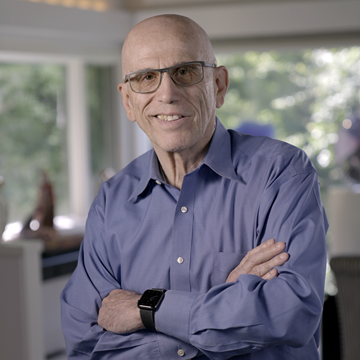
A native of Chicago, Charles L. "Larry" Marks studied biochemistry as an undergraduate and began his career working for Abbott Laboratories, an Illinois-based healthcare and medical device company. After earning his MBA from the University of Chicago, he was hired by Hewlett Packard, which at that time (the late 1960s) was one of very few tech firms headquartered in northern California, in an area that would become known worldwide as Silicon Valley.
The growing number of tech companies flocking to the Bay Area presented a golden opportunity and Mr. Marks left his job as a chemist and went into real estate, becoming a commercial property mortgage broker acquiring properties in what later became some of the most expensive zip codes in the United States.
A prominent supporter of local Jewish causes, Mr. Marks has held leadership positions at the Jewish Home and Senior Living Foundation of San Francisco and the Taube-Koret Campus for Jewish Life in Palo Alto, where he has been instrumental in establishing and maintaining Moldaw Residences, a senior living community.
The Weizmann Institute has been a major focus of Mr. Marks’ philanthropy for the past decade. Together with his wife, Dr. Gladys Monroy, who is also receiving a PhD honoris causa this year, he serves on the National Board of Directors of the American Committee for the Weizmann Institute of Science, as well as on its Executive Committee, and is a life member of the Institute’s International Board. Mr. Marks also served as co-chair of the American Committee's Vera and Chaim Weizmann Honor Society.
In 2010, Mr. Marks was diagnosed with multiple myeloma; it was an experimental combination of therapeutics that put his disease into remission. Of this experience, he states: “There was nothing that happened to me that was more definitive in my thinking about how important scientific research is than the life-saving treatment I received.” With his wife at his side, Mr. Marks’ commitment to the Weizmann Institute’s mission grew deeper. Their most recent gift – a magnanimous, multi-year commitment that established the Monroy-Marks Integrative Center for Brain Disorder Research, a pillar of the Azrieli Institute for Brain and Neural Sciences – supports translational disease-related research and expands on their already generous support of cutting-edge neuroscience at Weizmann. They also endowed the Monroy-Marks Career Development Chair, whose newest incumbent is neuroscientist Dr. Yarden Cohen, and – hearkening back to Larry’s days as a chemist – a Research Fellow Chair that supports the work of staff scientist Dr. Tali Scherf in the Chemical Research Support Department.
After attending the Institute’s 2012 Global Gathering in Montreal, Mr. Marks said he became “hooked on the wonderful community that is the Weizmann global family.” At the 2014 Global Gathering in New York, he and his wife were inducted into the exclusive President’s Circle.
The degree is awarded to Mr. Marks in recognition of his generous support of bold neuroscience research at the Weizmann Institute, most recently through the establishment of the Monroy-Marks Integrative Center for Brain Disorder Research; his inspiring leadership at the American Committee for the Weizmann Institute of Science, in service to science for the future of humanity; and his deep commitment to championing Jewish causes, particularly in the United States.
Dr. Gladys Monroy
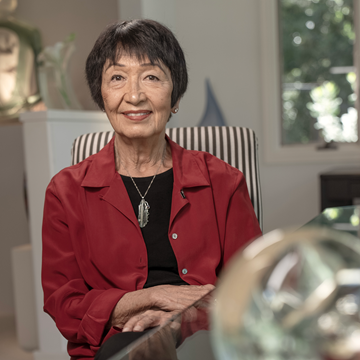
A leading intellectual property lawyer, Dr. Gladys Monroy served as a senior partner at Morrison & Foerster LLP, a multinational law firm where she founded and headed the Patent Law Group until her retirement in 2015. Dr. Monroy is also a biochemist: She holds a PhD from New York University, conducted postdoctoral research at Albert Einstein College of Medicine and served as an assistant professor at New York Medical College, where she headed her own research lab.
Among her many advisory roles, Dr. Monroy served as president of the Silicon Valley Intellectual Property Law Association and on the board of the Intellectual Property Committee of the State Bar. She also sits on the boards of Cancer Commons, the Myeloma Institute of the University of Arkansas and GPN Vaccines, and is a trustee of the American Association for Cancer Research Foundation. She has won numerous accolades for her legal work, including being named Intellectual Property Lawyer of the Year as part of the Chambers Women in Law Awards for 2012.
Born in New York, Dr. Monroy has lived in California since the 1980s. While working as a research associate at the University of California, San Francisco, she noticed that many successful scientists, struggling to obtain grants from traditional funding agencies, leave academia to launch biotech startups. Seeking a way to keep some of the monetary windfalls of this intellectual property on campus, where it can fund future research, Dr. Monroy entered law school at the University of San Francisco, earning her JD in 1986 and embarking on a successful career as a patent attorney.
Dr. Monroy’s passion for scientific discovery is reflected in her devotion to the Weizmann Institute. Together with her husband, Larry Marks, a fellow honorary PhD recipient, she served as co-chair of the American Committee’s Bay Area Region, led an American Committee mission to Israel and in 2014, was inducted into the President’s Circle. A life member of the Weizmann Institute’s International Board, she became the president of the American Committee in 2019.
Dr. Monroy first learned about the Weizmann Institute as a postdoc, when she published research together with Prof. Yoram Groner, who would go on to do pioneering work in molecular genetics and serve as the Weizmann’s vice president. They have remained friends for some 50 years. Prof. Groner was Dr. Monroy’s gateway to the Weizmann Institute, which she and Larry – who trained in chemistry before moving into a career in real estate – both enthusiastically support.
Among their philanthropic gifts, the couple established the Monroy-Marks Career Development Chair – held by neuroscientist Dr. Yarden Cohen – and a Research Fellow Chair, held by staff scientist Dr. Tali Scherf, head of the Institute’s Nuclear Magnetic Resonance (NMR) Unit in the Chemical Research Support Department. Increasing the impact of a center for neuroscience research they generously funded in 2017, they recently added to their giving to establish the Monroy-Marks Integrative Center for Brain Disorder Research within the flagship Azrieli Institute for Brain and Neural Sciences.
Dr. Monroy continues to cultivate and expand the Institute’s circle of supporters in the United States.
The degree is awarded to Dr. Monroy in recognition of her commitment to advancing Weizmann neuroscience, most recently through the creation of the Monroy-Marks Integrative Center for Brain Disorder Research; her instrumental leadership roles on the American Committee for the Weizmann Institute of Science and her active promotion of the institute in the United States; and her stellar achievements in the areas of biochemistry and intellectual property law.
